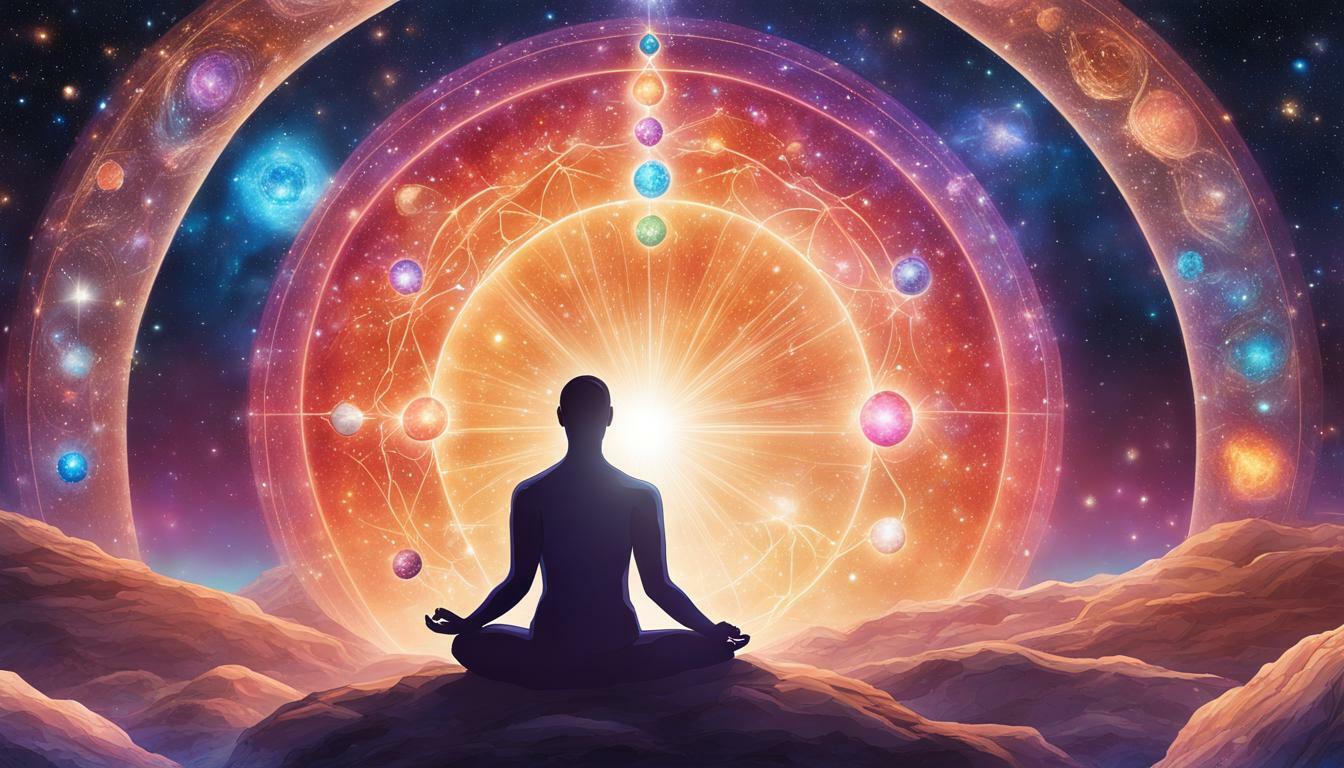The idea of karma has always fascinated me as a journalist with a strong interest in spirituality and personal development. In many cultures and religions, karma is seen as the universal law of cause and effect – the idea that our actions have consequences that reverberate throughout our lives. The 12 Laws of Karma are a set of principles that govern this law, offering insights into how we can live more fulfilling and rewarding lives.
Key Takeaways:
- The 12 Laws of Karma offer a comprehensive guide to understanding this universal law.
- Karma is the belief that our actions have consequences that shape our lives.
- The laws of cause and effect are fundamental to karma, with positive actions leading to positive consequences and negative actions resulting in negative consequences.
Exploring the Origins of Karma
As someone who is interested in understanding karma, it is essential to know its origins. Karma has its roots in Hinduism, one of the world’s oldest and most complex religions.
In Hinduism, karma is a fundamental concept that refers to the idea that our actions, thoughts, and intentions have consequences. These consequences can affect our current and future lives and dictate our karmic destiny.
Karma is a Sanskrit word that translates to action or deed. It is believed that every action we take in life, whether good or bad, has a corresponding result that shapes our destiny.
According to Hinduism, life is a cycle of birth and rebirth, with each life determined by our karmic debt from previous lives. This belief in karmic destiny emphasizes the importance of positive actions and intentions in shaping a better future.
Understanding the role of karma in Hinduism is crucial to understanding its broader significance in other cultures and religions.
The Law of Cause and Effect
Karma is often equated with the law of cause and effect. Simply put, this law dictates that our actions have consequences, whether positive or negative. If we perform good deeds, we can expect good things to happen in return, while negative actions will likely result in negative consequences.
The balance of these consequences is what creates our karmic debt. If we have accumulated more negative karma than positive, we will experience negative consequences until we have balanced the scale. Likewise, if we have more positive karma, we will experience positive outcomes in our lives.
It’s important to note that the consequences of our actions may not be immediate. The effects of our deeds may manifest in this lifetime or in future reincarnations. This is why it’s crucial to have a long-term perspective when it comes to balancing our karmic debt.
To balance our karmic debt, we must take responsibility for our actions and strive to perform positive deeds. This involves acknowledging the consequences of our negative actions and seeking to make amends. We can also generate positive karma by performing selfless acts and living a virtuous life.
Ultimately, understanding the law of cause and effect is crucial to living a fulfilling life. By being mindful of our actions and striving to create positive karma, we can experience a sense of peace and fulfillment.
Understanding the Cycle of Karma
The concept of karma emphasizes the cyclical nature of cause and effect. Our actions create a cycle of positive or negative energy that affects our present and future experiences. The law of action and reaction reinforces this cyclical process, stating that every action has an equal and opposite reaction.
When we perform positive actions, we generate positive energy that returns to us in the form of good karma. Conversely, engaging in negative actions creates negative energy that results in bad karma. This cycle of cause and effect is ongoing, and our present experiences are a result of our past actions.
It is important to understand that the effects of our actions do not always manifest immediately. Sometimes, they may take years or even lifetimes to appear. This delayed effect is known as the law of delayed karma.
One of the ways we can break this cycle of negative energy is by acknowledging and taking responsibility for our actions. This means being mindful of the consequences of our actions and striving to perform positive actions that generate good karma. By doing so, we can create a positive cycle of energy that brings happiness and fulfillment into our lives.
Law of Cause and Effect
The foundation of karma is the law of cause and effect. This law states that our actions have consequences that determine the course of our lives. Positive actions lead to positive consequences, while negative actions result in negative consequences. It is important to note that these consequences may not be immediate and may take time to manifest.
When we perform positive actions, we generate positive energy that returns to us in the form of good karma. Similarly, negative actions create negative energy that results in bad karma. Understanding this fundamental law of karma can help us become more mindful of our actions and the impact they have on our lives.
By balancing our karmic debt through positive actions, we can break the cycle of negative energy and attract positive experiences into our lives.
The Law of Cosmic Justice
One of the most fascinating aspects of karma is its belief in cosmic justice. The law of cosmic justice is based on the idea that the universe ensures fairness and balance in all things. This means that every action we take will have an equal and opposite reaction, whether it be positive or negative.
The law of cosmic justice is not a form of punishment but rather a means of restoring balance and harmony. It is a powerful reminder that our actions have consequences and that we are responsible for the energy we put out into the world.
The law of cosmic justice teaches us that we cannot escape the consequences of our actions. Every single action we take creates a ripple effect that extends far beyond our immediate surroundings. This ripple effect can be felt in our relationships, our careers, and our overall well-being.
When we adhere to the 12 Laws of Karma and live according to the principles of compassion, kindness, and love, we create positive energy that has the power to elevate our lives and the lives of those around us. On the other hand, when we act with negativity, anger, or cruelty, we create negative energy that can have detrimental consequences for ourselves and others.
The law of cosmic justice reinforces the importance of aligning our actions with our highest values and aspirations. When we act in alignment with our true selves, we create a positive flow of energy that attracts more positivity into our lives.
Understanding and applying the law of cosmic justice can be a transformative experience. It empowers us to take responsibility for our actions and to live with greater awareness and intention. By embracing the principles of karma and cosmic justice, we can create a life of abundance, fulfillment, and joy.
Understanding Karmic Consequences
As we have discussed in earlier sections, every action we take has consequences in the context of karma. These consequences can be positive or negative, depending on the nature of the action and the intention behind it. When we engage in positive actions, such as acts of kindness, generosity, and compassion, we generate positive karma that can lead to favorable consequences in our lives. Conversely, when we engage in negative actions, such as acts of greed, anger, and ignorance, we create negative karma that can lead to unfavorable consequences.
It is important to understand that the consequences of our actions are not immediate, but rather, they accumulate over time and can have an impact on our present and future lives. This means that even if we do not experience the results of our actions right away, we will eventually have to face them, either in this life or in a future one.
The concept of karmic consequences also highlights the importance of taking responsibility for our actions. When we understand that our actions have an impact on ourselves and others, we become more mindful of our behavior and the intentions behind it. By taking responsibility for our actions, we can actively work towards reducing negative karma and generating positive karma in our lives.
In order to balance our karmic energy and minimize negative consequences, we must also learn to let go of negative emotions and thoughts that can lead to negative actions. When we hold onto anger, envy, or resentment towards others, we are more likely to engage in negative behavior and create negative karma. By cultivating positive emotions and thoughts, such as gratitude, forgiveness, and empathy, we create a positive inner environment that allows us to engage in positive actions and create positive karma.
Karma and Rebirth
One of the most fascinating aspects of karma is its connection to reincarnation. According to the law of karma, our actions in this life determine our future lives. This process is called rebirth or reincarnation, and it is a fundamental concept in many cultures and religions.
In Hinduism, the belief in karma plays a central role in shaping one’s karmic destiny. The ultimate goal is to break the cycle of rebirth by achieving moksha, or liberation from the cycle of birth and death. The way to achieve this is by accumulating positive karma through good deeds and righteous actions.
Similarly, in Buddhism, the law of karma is intimately connected to the concept of rebirth. Buddhists believe that the cycle of rebirth is caused by the craving and attachment that result from our actions. By breaking free from this vicious cycle of craving and attachment, one can attain Nirvana, a state of enlightenment and liberation.
However, it’s important to note that the concept of rebirth is not limited to Eastern religions. Many Western philosophers, such as Plato and Pythagoras, also believed in the transmigration of the soul and the concept of reincarnation.
Ultimately, the idea of rebirth underscores the interconnectedness of all life and the responsibility we have to be mindful of our actions. By understanding the law of karma and striving to accumulate positive karma, we can shape our future lives and, ultimately, our destiny.
Balancing Karmic Energy
While the concept of karma may seem overwhelming, there are practical techniques you can use to balance your karmic debt and generate positive energy in your life. Here are some tips:
- Practice self-awareness: It’s essential to reflect on your thoughts and actions to determine if they align with your intentions. This self-awareness helps you avoid negative actions that generate bad karma.
- Be kind: The act of kindness generates positive energy that can help you balance your karmic debt. Whether it’s a smile, a kind word, or a helping hand, every kind act can make a difference.
- Forgive: Holding on to anger and resentment generates negative energy that can impact your karma. Forgiving others and letting go of grudges is essential for balancing your karmic energy.
- Live mindfully: Be present in the moment and make conscious decisions. Avoid acting on impulse and take the time to consider the consequences of your actions before taking them.
- Practice meditation: Meditation can help you cultivate inner peace and clarity, making it easier to act with positive intention and generate good karma.
Remember that balancing your karmic energy isn’t about being perfect or avoiding mistakes altogether. It’s about acknowledging your mistakes and making amends. By taking positive actions and cultivating positive energy, you can balance your karmic debt and live a more fulfilling life.
The Power of Intention in Karma
Understanding karma goes beyond just understanding cause and effect. It’s essential to recognize the power of intention in our actions, as intentions play a crucial role in shaping our karmic outcomes.
It’s not just what we do, but why we do it that matters. Even the smallest actions can have significant karmic repercussions, depending on our intentions behind them. By cultivating positive intentions and goodwill, we can create positive karma and benefit not only ourselves but also those around us.
On the other hand, negative intentions behind our actions can lead to negative karmic consequences, causing pain and suffering to ourselves and others. That’s why it’s vital to examine our motivations before performing any action and ensure they align with our values and beliefs.
When we undertake any action with good intentions, we create a positive ripple in the universe, which has the potential to set off a chain reaction of positive consequences. As the saying goes, “what goes around comes around,” and the same applies to our intentions.
The power of intention in karma emphasizes the importance of mindfulness and self-awareness in our daily lives. By being mindful of our intentions and actions, we can align them with our highest values and achieve better karmic outcomes.
Conclusion
Understanding and applying the 12 Laws of Karma can have a profound impact on our lives. We have explored the origins of karma, its fundamental law of cause and effect, and the cyclical nature of karma. We have also discussed the concept of cosmic justice, the consequences of our actions, and the connection between karma and rebirth.
It is important to note that karma in Hinduism is not just a philosophy but also a way of life. It teaches us to take responsibility for our actions and to strive for balance in our karmic debt. By balancing our karmic energy, we can create a positive cycle of cause and effect that leads to a more fulfilling life.
To balance our karmic debt, we can practice mindfulness, kindness, and gratitude. We can also take actions that benefit ourselves, others, and the environment. It is important to remember that our intentions behind our actions shape the karmic consequences we experience. Therefore, we must focus on cultivating positive intentions as well.
In conclusion, understanding the 12 Laws of Karma can empower us to take control of our lives and create a more positive future. By embracing this ancient wisdom, we can transform ourselves and the world around us.






